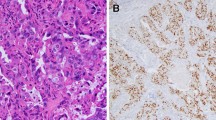Abstract
Introduction
Salivary duct carcinoma (SDC) is a rare, high-grade salivary gland malignancy. Recently, targeting the androgen receptor (AR) is one of the most promising new therapeutic strategies for AR-positive SDC.
Case Review
In this report, a 70-year-old man who was diagnosed with an AR-positive SDC underwent androgen deprivation therapy (ADT) as a treatment for recurrence after primary therapy. The ADT well contributed to control of SDC; however, the patient was referred to urologists for urinary hesitancy and slow flow and he was diagnosed as having castration-resistant prostate cancer.
Literature Review
Since SDC is a rare disease, it has been difficult to establish the most effective therapy. Nevertheless, several papers have reported the clinical benefit of ADT for AR-positive SDC, and the latest version of the National Comprehensive Cancer Network guidelines also states the importance of assessing for the presence of AR in SDC.
On the other hand, in the field of urology, it is also known that although ADT is initially effective in prostate cancer patients, prostate cancer often develops into castrate-resistant prostate cancer due to the adaptation of prostate cancer cells to ADT for survival and growth.
Conclusion
We reported a case of castrate-resistant prostate cancer diagnosed during the ADT for metastatic SDC. The present case emphasizes the importance of screening for prostate cancer at the initiation of ADT treatment and during treatment.


Similar content being viewed by others
Data Availability
The data that support the findings of this study are available from the corresponding author, Shugo Yajima, upon reasonable request.
Abbreviations
- ADT:
-
Androgen deprivation therapy
- AR:
-
Androgen receptors
- CAB:
-
Combined androgen blockade
- CRPC:
-
Castration-resistant prostate cancer
- CT:
-
Computed tomography
- DWI:
-
Diffusion-weighted magnetic resonance image
- HER2:
-
Human epidermal growth factor receptor 2
- LH:
-
Luteinizing hormone
- MR:
-
Magnetic resonance
- MRI:
-
Magnetic resonance imaging
- NSE:
-
Neuron-specific enolase
- PET:
-
Positron emission tomography
- PD:
-
Progressive disease
- PSA:
-
Prostate-specific antigen
- SD:
-
Stable disease
- SDC:
-
Salivary duct carcinoma
References
Guzzo M, Di Palma S, Grandi C, Molinari R (1997) Salivary duct carcinoma: clinical characteristics and treatment strategies. Head Neck 19(2):126–133. https://doi.org/10.1002/(sici)1097-0347(199703)19:2%3c126::aid-hed7%3e3.0.co;2-6
Moriki T, Ueta S, Takahashi T, Mitani M, Ichien M (2001) Salivary duct carcinoma: cytologic characteristics and application of androgen receptor immunostaining for diagnosis. Cancer 93(5):344–350. https://doi.org/10.1002/cncr.9050
Kleinsasser O, Klein HJ, Hübner G (1968) Salivary duct carcinoma: a group of salivary gland tumors analogous to mammary duct carcinoma. Arch Klin Exp Ohren Nasen Kehlkopfheilkd 192(1):100–105
Guzzo M, Locati LD, Prott FJ, Gatta G, McGurk M, Licitra L (2010) Major and minor salivary gland tumors. Crit Rev Oncol Hematol 74(2):134–148. https://doi.org/10.1016/j.critrevonc.2009.10.004
Fan CY, Wang J, Barnes EL (2000) Expression of androgen receptor and prostatic specific markers in salivary duct carcinoma: an immunohistochemical analysis of 13 cases and review of the literature. Am J Surg Pathol 24(4):579–586. https://doi.org/10.1097/00000478-200004000-00014
van Boxtel W, Locati LD, van Engen-van Grunsven ACH, Bergamini C, Jonker MA, Fiets E et al (2019) Adjuvant androgen deprivation therapy for poor-risk androgen receptor–positive salivary duct carcinoma. Eur J Cancer 110:62–70. https://doi.org/10.1016/j.ejca.2018.12.035
Jaspers HCJ, Verbist BM, Schoffelen R, Mattijssen V, Slootweg PJ, van der Graaf WTA et al (2011) Androgen receptor-positive salivary duct carcinoma: a disease entity with promising new treatment options. J Clin Oncol 29(16):e473–e476. https://doi.org/10.1200/JCO.2010.32.8351
Nakaguro M, Tada Y, Faquin WC, Sadow PM, Wirth LJ, Nagao T (2020) Salivary duct carcinoma: updates in histology, cytology, molecular biology, and treatment. Cancer Cytopathol 128(10):693–703. https://doi.org/10.1002/cncy.22288
Harris WP, Mostaghel EA, Nelson PS, Montgomery B (2009) Androgen deprivation therapy: progress in understanding mechanisms of resistance and optimizing androgen depletion. Nat Clin Pract Urol 6(2):76–85. https://doi.org/10.1038/ncpuro1296
Nouri M, Caradec J, Lubik AA, Li N, Hollier BG, Takhar M et al (2017) Therapy-induced developmental reprogramming of prostate cancer cells and acquired therapy resistance. Oncotarget 8(12):49–67. https://doi.org/10.18632/oncotarget.14850
Funding
Not applicable
Author information
Authors and Affiliations
Contributions
SY wrote the first draft of the manuscript. All authors reviewed and edited the manuscript and approved the final version of the manuscript.
Corresponding author
Ethics declarations
Conflict of interest
The authors declare that they have no conflict of interest.
Ethical Approval
Ethical approval to report this case was obtained from National Cancer Center Institutional Review Board.
Consent for Publication
Informed consent document clearly spells this out at the time of participation.
Consent to Participate
Informed consent document clearly spells this out at the time of participation.
Additional information
Publisher's Note
Springer Nature remains neutral with regard to jurisdictional claims in published maps and institutional affiliations.
Rights and permissions
About this article
Cite this article
Yajima, S., Nakanishi, Y., Matsumoto, S. et al. A Pitfall of the Androgen Deprivation Therapy for Salivary Duct Carcinoma: Hormonal Therapy-Induced Castrate-Resistant Prostate Cancer. J. Maxillofac. Oral Surg. 21, 1097–1100 (2022). https://doi.org/10.1007/s12663-022-01730-5
Received:
Accepted:
Published:
Issue Date:
DOI: https://doi.org/10.1007/s12663-022-01730-5




